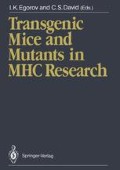Abstract
The study of variants induced by mutagenesis has been extremely important in understanding many biological systems (Drake 1969). In the case of the mouse histocompatibility complex (MHC) H-2 mutants have been important in the definition of pleiotropic effects of single MHC genes. These mutants were laboriously isolated by screening for skin graft rejection (Melvold et al. 1982). The generation of such spontaneous mutants, however, is time consuming and difficult. Several laboratories have used in vitro selection techniques (by monoclonal antibodies) as an alternative, (Flores and Rajan 1977; Pious et al. 1982) others have used molecular genetics techniques (Shiroishi et al. 1985). These include using site directed mutagenesis and in vitro recombination. The in vitro recombinants have been crucial in establishing that the α1 and α2 domains of MHC class I molecules interact significantly to form the class I peptide binding structure recognized by T cells (Darsley et al. 1987). This was later confirmed using X-ray crystallography on the isolated HLA-A2 protein (Bjorkman et al. 1987a).
Access this chapter
Tax calculation will be finalised at checkout
Purchases are for personal use only
Preview
Unable to display preview. Download preview PDF.
References
Ahmed R, Byrne JA, Oldstone MBA (1984) Virus specificity of cytotoxic T lymphocytes generated during acute lymphocytic choriomeningitis virus infection: Role of the H-2 region in determining cross-reactivity for different lymphocytic choriomeningitis virus strains. J Virol 51: 34–41
Allen H, Fraser J, Flyer D, Calvin S, Flavell R (1986) β2-microglobulin is not required for cell surface expression of the murine class I histocompatibility antigen H-2Db or of a truncated H-2Db. Proc Natl Acad Sci USA 83: 7447–7451
Bjorkman PJ, Saper MA, Samraoui B, Bennett WS, Strominger JL, Wiley DC (1987a) Structure of the human class I histocompatibility antigen, HLA-A2. Nature 329: 506–512
Bjorkman PJ, Saper MA, Samraoui B, Bennett WS, Strominger JL, Wiley DC (1987b) The foreign antigen binding site and T cell recognition regions of class I histocompatibility antigens. Nature 329: 512–518
Darsley MJ, Takahashi H, Macchi MJ, Frelinger JA, Ozato K, Appella E (1987) New family of exon-shuffled recombinant genes reveals extensive interdomain interactions in class I histocompatibility antigens and identifies residues involved. J Exp Med 165: 211–222
Drake JW (1969) Mutagenic mechanisms. Ann Rev Gen 3: 247–269
Flores C, Rajan TV (1977) H-2 antigen variants in a cultured mouse leukemia cell line. II Effect of selection against a K-end gene. Immunogenetics 5: 295–308
Hutchison III CA, Nordeen SK, Vogt K, Edgell MH (1986) A complete library of point substitution mutations in the glucocorticoid response element of mouse mammary tumor virus. Proc Natl Acad Sci USA 83: 710–714
Melvold RW, Khon HI, Dunn GR (1982) History and genealogy of the H-2Kb mutants from the C57BL/6Kh colony. Immunogenetics 15: 177–185
Minami M, Okuda K, Sunday ME, Dorf ME (1982) H-2K-, H-2I- and H-2-D- restricted hybridoma contact sensitivity effector cells. Nature 297: 231–233
Murray R, Hutchison III CA, Frelinger JA (1988a) Saturation mutagenesis of a major histocompatibility complex protein domain: Identification of a single conserved amino acid important for allorecognition. Proc Natl Acad Sci USA 85: 3535–3539
Murray R, Pederson, Prosser H, Muller D, Hutchison III CA, Frelinger JA (1988b) Random oligonucleotide mutagenesis: application to a large protein coding sequence of a major histocompatibility complex class I gene, H-2DP. Nucleic Acids Res 16: 9761–9773
Pious D, Krangle MS, Dixon LL, Parham P, Strominger JL (1982) HLA structural gene mutants selected with an allospecific monoclonal antibody. Proc Natl Acad Sci USA 79: 7832–7836
Shiroishi T,,Evan GA, Appella E, Ozato K (1985) In vitro mutagenesis of a mouse MHC class I gene for the examination of structure-function relationships. J Immunol 134: 623–629
Author information
Authors and Affiliations
Editor information
Editors and Affiliations
Rights and permissions
Copyright information
© 1990 Springer-Verlag Berlin Heidelberg
About this paper
Cite this paper
Katoh, K., Murray, R., Muller, D., Frelinger, J.A. (1990). Random Mutagenesis by Oligonucleotides: A Probe for MHC Structure and Function. In: Egorov, I.K., David, C.S. (eds) Transgenic Mice and Mutants in MHC Research. Springer, Berlin, Heidelberg. https://doi.org/10.1007/978-3-642-75442-5_3
Download citation
DOI: https://doi.org/10.1007/978-3-642-75442-5_3
Publisher Name: Springer, Berlin, Heidelberg
Print ISBN: 978-3-642-75444-9
Online ISBN: 978-3-642-75442-5
eBook Packages: Springer Book Archive

